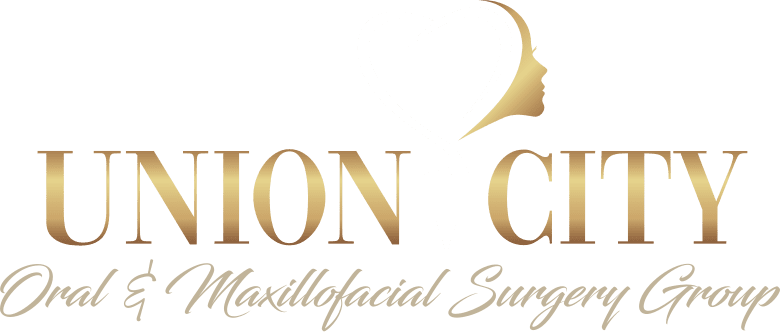Socket Preservation
Individuals who experience pain due to a tooth infection or bone loss may require tooth extraction to treat their symptoms. Once the tooth is extracted, the bone that holds the tooth in place, known as a socket, may become compromised. If the socket becomes infected, severe conditions such as gum recession, further bone loss, and jaw deformities may occur. Fortunately, socket preservation surgery can prevent severe socket conditions before they can escalate.
If you are looking for a medical professional to protect your socket health in Union City, look no further than the experienced medical professionals at Union City Oral Surgery Group. We are committed to protecting our patient’s oral health and personalizing our treatment plans to their unique needs. Our specialists employ the latest innovative and minimally-invasive techniques to prioritize rapid recovery times and help our patients get back to a pain-free life as quickly as possible.
What Is Socket Preservation?
Socket preservation encompasses several methods of preserving the bone and minimizing bone loss after tooth extraction. The procedure can significantly improve a smile’s appearance and increase the chances of a successful impact placement.
After tooth extraction, your body recognizes that it no longer needs the bone that held it in place and starts breaking it down, compromising your socket. As this occurs, the bone loss may affect the alignment of your teeth, and the appearance of your face, and may even advance to the point where replacing the tooth with a dental implant is impossible.
A common method of socket preservation consists of removing the tooth and filling the socket with bone or bone substitute. Filling in the socket encourages the body’s natural healing ability. This method eliminates shrinkage and prevents the collapse of the surrounding gum and facial tissues. The newly formed bone in the socket also provides a foundation for an implant to replace the extracted tooth.
Why Would a Tooth Be Extracted?
A dental professional may recommend tooth extraction because of:
- Damaged Teeth: Teeth that are damaged or broken beyond repair are often better to have extracted.
- Tooth Decay: A tooth that is decayed to the point that it can’t be treated with a filling, crown, or root canal is better to extract to protect your oral health
- Periodontal Disease: Bacteria that build up and form plaque underneath the gum can lead to gum disease. Periodontal disease can erode the gum tissue and bone causing teeth to loosen.
- Crowded Teeth: It’s possible to have a jaw too small to fit all your teeth, have extra teeth, or have teeth growing into or on top of other teeth. In this case, it’s necessary to extract a tooth to eliminate overcrowding.
Oral health is key to our overall health but rarely given as much attention as the rest of our body. At Union City Oral Surgery Group, we can provide you with the tools and information to make informed and proactive choices on your oral health.
Is Socket Preservation Recommended?
The human body is naturally efficient in healing itself. When you lose a tooth, the bone that supported it is no longer of service and begins to break down. The material is then re-used elsewhere in the body. While this seems like a perfectly reasonable process, it can also cause problems for your oral health.
As the bone breaks down, the surrounding teeth can start to shift out of place over time leading to a misaligned bite. The loss of bone height can affect the appearance of facial features and over time, the deterioration may reach a point where the bone is no longer strong or thick enough to support a dental implant.
A socket preservation procedure in Union City, NJ helps prevent these issues. After a tooth is extracted, the dentist will place extra bone into the socket to preserve its structural integrity and keep the area around it strong. The bone graft material can differ. It’s necessary to discuss your options with your oral surgeon to understand more about the best bone graft option for you. They can break down the different options and their benefits for your circumstances.
The Benefits of Socket Preservation?
Preserving your socket after a tooth extraction has several medical and cosmetic benefits, including the following:
- Bone preservation
- Protection of adjacent teeth
- Reduced risk of dry socket
- Promotes faster healing
- Reduced postoperative bleeding and discomfort
- Establishing a foundation for future teeth replacement (dental implants or dentures)
One of the most significant benefits of socket preservation in Union City, NJ is preventing dry sockets. This painful condition occurs when the blood clot that covers the wound left behind by the tooth extraction is dislodged or dissolved before the wound is healed. When this happens, the bone and nerve beneath the clot are left exposed. Dry sockets can cause intense pain in the socket that can radiate to other nerves in your face. If left untreated, food can get lodged in the socket and cause it to become infected, compromising the bone, gums, and surrounding teeth. Socket preservation fills the socket with bone material, preventing the nerves from becoming exposed and thus preventing an excruciating case of dry socket.
How Does Socket Preservation Play a Role in the Dental Implant Process?
If you want to get dental implants to replace missing or extracted teeth, it’s best to discuss the desire with your dentist. With this knowledge, the dentist can proceed to include socket preservation in the treatment plan from the beginning. If a socket is left untreated, it can cause serious health issues such as:
- Inability to chew or eat properly
- Increased risk of oral infection
- Increased risk of cavities
- Increased risk of gum disease
Furthermore, even the most experienced oral professionals cannot predict how the jawbone will behave after tooth removal. The success of a dental implant depends greatly on the health of your jawbone and the surrounding teeth and gums.
What to Expect After Socket Preservation
While socket preservation can speed up the healing process following a tooth extraction, it also requires its own healing and recovery process. Since a bone graft comprises several small particles, it is common to find small granules in your mouth following your procedure. However, there are several steps you can take to minimize the number of particles that exit your socket and expedite your recovery, including the following:
- Avoid disturbing or touching the extraction site
- Refrain from rinsing or spitting for at least two days to allow the graft to settle and a blood clot to form
- Do not run your tongue over the wound, as it may cause the material to shift during the healing process
- Do not pull on your lip to observe the wound to avoid tearing your sutures
- Refrain from smoking
- After the second day, rinse gently to avoid disturbing the wound
Your surgeon will provide a detailed recovery plan that outlines everything you must do to heal successfully. While socket preservation in Union City, NJ can prevent pain in the long run, you will likely experience pain in the days following the procedure. Your surgeon will likely recommend over-the-counter pain medication to help manage your symptoms as you heal and recover.
Schedule an Appointment with a Trusted Oral Surgeon at Union City Oral Surgery Group
The skilled specialists at Union City Oral Surgery Group are dedicated to protecting your oral health following a tooth extraction. We understand how painful and challenging issues like dry sockets and bone loss can be and can act quickly to prevent these issues from impacting your life. We take a patient-centric approach to oral surgery and will tailor our approach and recommendations to your unique needs.
When you entrust your oral health to us, you can rest assured that you will receive state-of-the-art care from a trusted and compassionate medical professional. To schedule an appointment and learn more about how our oral surgeons can help you, call us at (201) 601-9262 or complete our contact form today.


